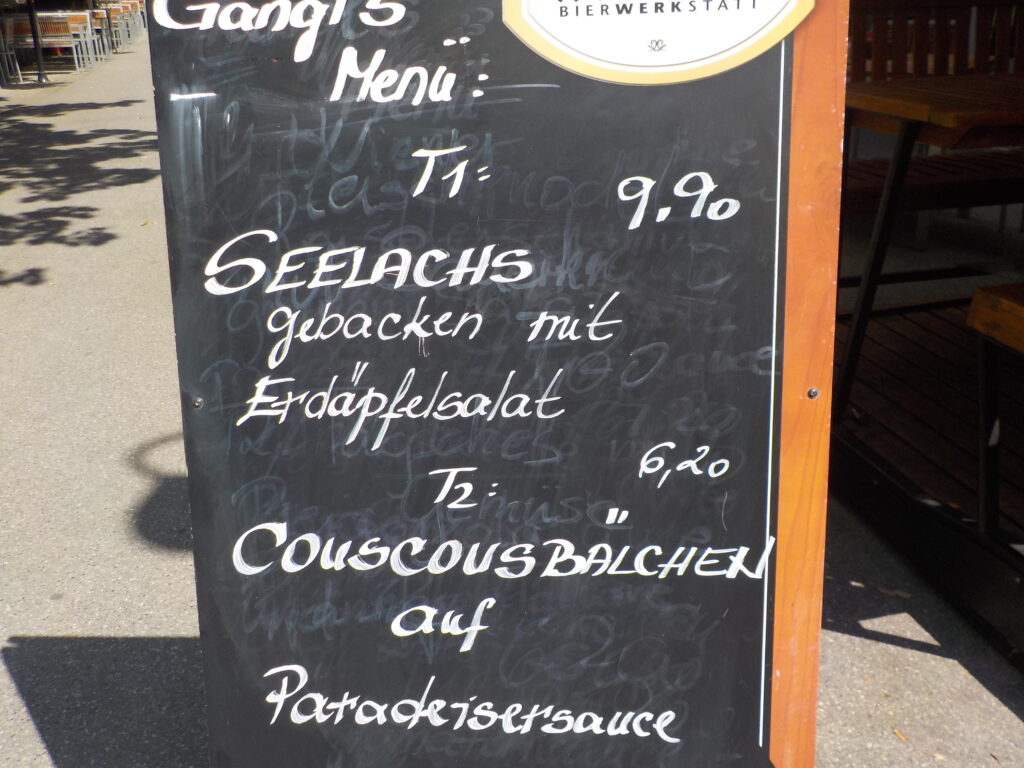In dieser Lektion
Hören
Lieblingsrestaurants
Watch the video of Anna and Stefan talking about their favorite restaurants in Berlin.
Arbeit mit dem Hören
Was bestellen Anna und Stefan gern in ihren Lieblingsrestaurants?
Wortschatz
Gerichte & Speisen
Wortschatz
Auf dem Tisch
Kultur
Speisekarten und Menüs
When going to any type of food establishment in a German-speaking country, it is important to know the difference between “Speisekarte” and “Menü.” Although the word “Menü” might look like a cognate to an English speaker, one should ask for the “Speisekarte” when looking for the menu. It typically contains a list of all foods and drinks. The term “Menü” designates that the place offers one or a variety of meals that can include a starter that is typically a soup, a main course (with a side of salad), and a dessert, which might be a piece of cake or “Topfencreme mit Früchten” or the like. Many restaurants offer “Tagesmenüs” for lunch.

Wasser und Trinkgeld
Unlike in the North American context, restaurants in German-speaking countries do not automatically provide customers with a glass of water. It can be frowned upon when one does not order a beverage and just asks for a glass of tap water (“Leitungswasser“). More often than not, customers will receive bottled, non-sparkling mineral water when ordering “Wasser,” for which they will have to pay.
However, a small glass of water almost always accompanies when ordering coffee at Austrian coffee houses. This is usually not the case in Germany.
Due to the ways in which waitresses and waiters are paid in German-speaking countries, it is less common to give a tip (Trinkgeld) in the same fashion (most often between 15 and 20%) as one would in North America. It is fairly common that people tend to round up to the closest whole number (or to 50 Euro Cents) when tipping for only drinks or small meals. So, for example, if the final bill is 5,60 Euro, most people tip 40 Cents and pay 6 Euros. However, if you have a larger bill (say, around 20 Euros), it is becoming standard to tip around 10%.
Strukturen
Modalverben: sollen (should) & dürfen (to be allowed to)
The modal verbs sollen and dürfen are used to express obligation and permission.
Dürfen shows a vowel change from an ü to an a in the singular present-tense forms. Sollen is unusual in that it is the only modal verb without a vowel change but follows the other modal verb conjugation patterns (no ending in the ich and singular sie / es / er / xier forms).
| singular | sollen (to ought to) | dürfen (to be allowed to) | plural | sollen (to ought to) | dürfen (to be allowed to) |
|---|---|---|---|---|---|
| ich | soll | darf | wir | sollen | dürfen |
| du | sollst | darfst | ihr | sollt | dürft |
| Sie | sollen | dürfen | Sie | sollen | dürfen |
| sie / es / er xier / they | soll | darf | sie | sollen | dürfen |
Sollen suggests that there is something one is supposed to do or ought to do, and can be combined with an expression of what one would really prefer to do (often with aber and wollen or mögen):
Heute soll ich Lebensmittel einkaufen, aber ich will in die Bar gehen.
The above sentence conveys that the speaker ought to buy groceries but would rather go to the bar. As with other modal verbs in the present tense, the verb sollen above is in 2nd position and the verb it modifies, einkaufen, is at the end of the sentence.
Dürfen indicates that one has permission or is allowed to do something. When combined with nicht or kein, it conveys that the action described is not permitted:
Das darf ich nicht.
Im Deutschkurs dürfen wir kein Englisch sprechen.
The above sentences convey that certain things are forbidden. The first sentence does not specify what is forbidden (das), but this would presumably be clear from the context. The second sentence clarifies both what is not allowed (speaking English) and where (in German class).
Arbeit mit sollen & dürfen
Sprechen
Arbeit mit Modalverben
Bilden Sie 2-er Gruppen und stellen Sie einander Fragen.
- Darfst du Alkohol trinken?
- Ich habe heute keine Zeit, aber will nicht im Restaurant essen. Was soll ich kochen?
- Darfst du viel Zucker essen?
- Ich habe nur Tomaten, Käse und Brot zu Hause und will heute mit dir Abendessen. Was soll ich noch einkaufen?
- Was darfst du nicht machen?
- Ich muss Obst kaufen. Soll ich lieber zum Supermarkt oder zum Markt gehen?
Modallverben üben
Have a conversation with some of your classmates about the following questions. Take notes about your answers. You may need the information for a writing assignment.
| Was kannst du kochen? |
| Was musst du diese Woche machen? |
| Was sollst du (nicht) machen? |
| Was darfst du (nicht) machen? |